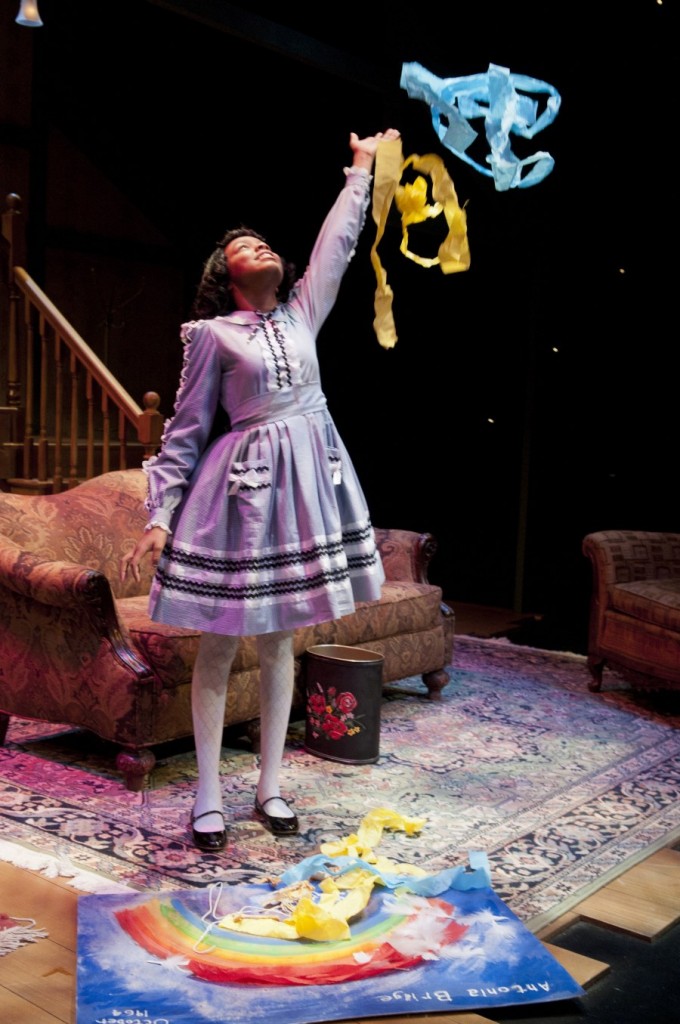Tyranny of the title. Page to stage. Movicals. While each of these terms describes a slightly different phenomenon, they all speak to the prevalence of adaptation in theatrical work. Adaptation has a long and storied history in the theatre—as playwright Charles Mee reminds us, Shakespeare and the ancient Greeks did it—but as many playwrights and artistic directors can attest, a theatre’s reliance on the familiar can make opportunities for new stories and new voices scarce. Consider the 40 professional productions of A Christmas Carol that took place nationwide last season compared to Disgraced’s 18 productions.
The “tyranny of the title” is particularly acute in the theatre for young audiences (TYA) world, where parents are often cost-conscious and risk-averse. But producing new work isn’t impossible. “Venues that present familiar titles know they can draw big crowds,” says Linda Habjan, vice president of acquisitions at Dramatic Publishing. “However, as more and more theatres commission new works and as these works get published and presented again and again, the canon grows and more and more people are introduced to these new original plays.”
First Stage Children’s Theater in Milwaukee has been getting around the “tyranny of the title” by commissioning new work that tells stories about the local community. In 2011, First Stage launched the Wisconsin Cycle, a cycle of six new plays that celebrate the people and history of the state, and the plays premiered over the course of six years.
“We find that the scripts that serve our purposes and our audiences are the ones that we create,” says First Stage artistic director Jeff Frank. “Bringing the community together to share these stories that might be new to some people and old to others, and coming together for that shared experience, really helps foster the greater sense of what community really means.”
The final play in the cycle, Welcome to Bronzeville by Sheri Williams Pannell, revolves around the 1950s music scene in a historic African-American neighborhood and will premiere in January 2017. During the development process, Pannell went from dramaturg to playwright, and there were six workshops of the script with plenty of community involvement. “We spent a lot of time just talking with the elders of the community, hearing stories that we might respond to, and finding a hook for our story and where we wanted to go,” explains Frank.

Playwright Suzan Zeder also relied on community outreach in developing her play When She Had Wings, which Imagination Stage in Bethesda, Md., commissioned and premiered in fall 2015. The play follows B, a girl who fantasizes about flying in her makeshift treehouse plane and who befriends a strange elderly woman called A—who may or may not be Amelia Earhart.
Zeder’s initial concept for the piece began with a desire to explore common human responses to the idea of flight. “It started out with the conviction that all human beings, no matter how old they are, dream and are emboldened by the idea of flying,” she explains.
The process included a partnership with the Lucy School of Middleton, Md., where students had a yearlong interdisciplinary unit on flight, and the students gave Zeder feedback as she developed the piece.
Zeder maintains that TYA producers can find a way to tell new stories if they’re committed to the task. “Producers have to find that sweet spot in their season where they can afford to take the risk and be proactive,” she says. “It starts with saying, ‘We’ve got to build our own literature.’”
Finegan Kruckmeyer, TYA advocate and author of one of the Wisconsin’s Cycle’s previous installments, The Snow, thinks producing new work is particularly important for young audience members because it respects “a child audience’s myriad tastes, perspectives, and thematic stamina.”
First Stage is not immune to the box office pressure, as the majority of the plays slated for the company’s 2016-17 season have credited source material. However, the company’s commitment to telling original stories ensures that there’s always a “sweet spot” in their season. “Our marketing staff would flip out over a season of all original shows,” Frank admits. “But theatre is about taking risks, and we’re never going to have a season that’s entirely title-driven.”
And as John Maclay, First Stage associate artistic director and director of the Young Company, points out, a title alone doesn’t necessarily translate to financial solvency. “When a popular show lacks substance, I wonder if it’s actually a good long-term success for the organization,” he says. “We’ve had original pieces which perhaps didn’t sell as well initially but that people talked about effusively for years. I think the goal should always be that the greatest art is always the best long-term sales plan.”
In recent years, Zeder, Kruckmeyer, and the First Stage artistic leadership have brought new work to the Kennedy Center’s New Visions/New Voices Festival, a weeklong biennial development workshop for theatremakers. Dramatic Publishing’s Habjan affirms the festival’s importance to the development of original work, saying that it “provides the support and visibility that allows authors to connect and exchange ideas and resources.”
Zeder and Imagination Stage workshopped When She Had Wings at the festival in 2014, and First Stage workshopped Eric Coble’s play TXT U L8R at the event in May. First Stage commissioned TXT U L8R for its high school-aged Young Company; the magical realist tale is about a group of students whose cell phones take on lives on their own.
At the start of the development process, Coble posed a series of questions to the Young Company about technology, and they responded by posting answers to YouTube. “We wanted the Young Company to inform what that piece might be,” explains Frank. And Maclay notes that they’re beginning to think about incorporating technology into the production as well. “Once we actually staged it for the zero-tech reading, I spent a lot of time thinking about how we will craft this next season with an actual production budget,” he adds.
While there does seem to be a desire for original stories to have more visibility, no one wants to see adaptation go away. “There’s room for both, and one should not eclipse the other,” says Zeder. “What’s discouraging is when theatres feel that they cannot take risks on an original story.” Says Maclay, who has adapted some stories himself, “Anyone who has done both knows that it is a completely different process and can be incredibly challenging to get right.”
Still, there’s a consensus that original stories can offer theatregoing experiences that adaptations just can’t replicate. “There’s a tangible excitement that comes with sitting down to a story—in any medium—which hasn’t yet explained its rules to you,” Kruckemeyer explains. “Characters can then be met in a manner akin to those in real life: They begin as strangers, you learn a little about them, some resonate more than others, and an investment in their situation forms.”
Habjan sees new stories as an essential way to speak to contemporary kids, and thus ensure future generations’ interest in theatre. “The goal is to offer thoughtful, challenging plays about complex issues facing young people today: plays that present diversity, plays that reflect a variety of ethnic groups and cultures, and plays that present themes relevant to their lives,” she says. “Original dramatic literature written by committed and creative authors goes a long way toward creating lifelong theatre lovers.”


